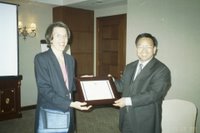Career Development delegate notes, part 1.

People to People Ambassador Program has offered the Career Development Professional Delegation to the People’s Republic of China one incredible program!! I can’t say enough about how well planned this trip has been. People to People set up numerous visits with our counterparts in China, from official state offices, college campuses, to private enterprise initiatives in career development, and state-run community centers.
It has to be noted too, that because of this trip, we have had the pleasure to be introduced to the elegance of the Chinese people. We have had many opportunities to interact with such gracious hosts in every leg of our journey: in the San Francisco Airport where we were so elegantly greeted and respectfully escorted by Cathay Pacific staff through the ticketing process; the gentle and attentive service from the flight attendants on a very long flight to Hong Kong; the bus drivers who took us everywhere in unbelievably congested cities with polite mastery of their skill; hotel personnel, retail personnel, all so refined, gracious and attentive to one’s every move. This is an experience we all agreed we won’t forget.
I have also had the marvelous opportunity to meet with experienced career counselors from all over the U. S. as well. Directors of career services and career counselors from Cornell University; Georgia State University; George Mason University; College of DuPage; Bryn Mawr; Aquinas College, Community College –Hawaii – and - private career consultants as well. I found each one of these professionals wonderfully experienced, and willing to share great techniques and innovative career development strategies.
PROFESSIONAL MEETINGS:
Before this visit, I had no understanding of any real need for career planning services in China.
I now know why career development is growing and becoming popular in this country. Professional visits were incredibly insightful and inspiring. I hope to relate a few of the highlights of these visits, so you too can discover as I have, how students and workers in this economy-driven society are voicing their need more and more for assistance in the job search and even for attaining career satisfaction.
Our first session was with the Chinese Minister of Labor who provided information concerning the status of the labor market and economy in China today.
 (photo by Catherine McCormick)
(photo by Catherine McCormick)China faces an ever-growing market economy which is no longer government driven. There are over 500 million laborers in the country: 76% are still in farming; 12% are working in the industrial area; 11 % in service businesses - (hotels, department stores, restaurants…)
The trend is for more and more farmers to go to the industry and service sectors. In the last 2 to 3 years, 150 million farmers have been looking for work, mostly male and young: 64% under 35! Dislocation of this population is due to construction and, a desire to seek hire wages in the cities.
Main points covered in this meeting:
- Government encourages private investment and growth through loan initiatives
- 82% of China’s industry is now in the hands of private enterprise
- Since 1990s, state-owned enterprises have been letting go of workers due to poor profits.
private and entrepreneurial enterprises are now the main resources for the unemployed.
- There are over 30 million private enterprises – only 1% of private enterprise is considered big,
hiring over 1,000 workers
- Since the 1990s, 6 million new working opportunities exits within private enterprise.
- ¾ of the total urban population now works in private enterprise
- Since 1990s, 60% of the workers laid off by the State, found employment with private
businesses.
- Private enterprises take in over 50% of the China’s total GDP
- Private enterprise is responsible for over 62% of the exports of total GDP
So, in the past, before you reached age of retirement, government had to assign you a job – now – not responsible – everyone must find their own job. Only those laid off from a state-owned job will receive assistance in finding new employment by the government.
For those workers laid off by state-owned enterprises, the government offers 3 years unemployment insurance while the worker tries to relocate. During this period, workers must register with ‘second job station’ in which government tries to help workers find new employment and re-training. Re-training is based upon past learning and training experience. Unskilled workers must depend on the government for finding new job opportunities.
Today, skilled and educated workers tend to look for their own working opportunities. Government is not responsible for assisting this population. Many university graduates could find work in western China, away from the urban centers of the east coast, but many graduates do not want to travel to the west to look for work. The pay is lower and living conditions are ‘stressed’.
Middle age and older workers will find it next to impossible to find good jobs because new training and education opportunities for this age group do not exist.
By 2011, it is projected that there will be no laid off workers because of the changing demographics of the population…most of the older workers will have reached retirement age, which is 60 years for men and 50 years for women. State workers will receive a pension.
For those workers who have worked 2 years or more and laid off by private business, workers will receive 2 years unemployment compensation.
If the government finds you a new job and you don’t want it, your unemployment insurance will be cancelled.
The government is still responsible for 50% of job location and training. Eventually, however, the government wants to pull out entirely. Many more private training programs must be developed to meet the need of the growing market.
Largest government owned enterprises today are:
- oil
- gas
- steel
- telecommunications
- transportation (airlines, rails, cargo shipping)
A new phenomena has developed in China’s employment scene: the temporary worker – or what’s called - the moving population - going from job to job.
There are over 40 million farmers coming to the city to find work, and find themselves in this unfortunate work-status.
3 million workers have been laid off from the collectives and state-owned enterprises as well, since the 1990s. So, today, the government encourages people to start their own businesses by offering government loans. Also, the government encourages workers to find part or seasonal jobs.
The government recognizes that there is a need for more and more training initiatives to help laid off workers from industry lay offs and for the dislocated farmers. This year alone, the central government plans to invest over 400 million yuan towards training programs.
Impact on Career Development:
There does not exist career counseling for most of China’s workers, however. They are expected to register in Second Work Station where the government will try to re-assign the worker.
Government requires private enterprises to provide for free career counseling for laid off workers.
Because jobs are hard to find, and there are so many graduates from the universities, many graduates go back to technical school in order to find employment. Or, many go on to get master and doctorate degrees and go into research. It was noted that two Universities that delegates traveled to, Beijing University and Beijing Normal University, have more graduate students than undergraduates. This is true for many of China’s higher education institutions. Many graduates do not use their professional degree but instead, find themselves in jobs totally unrelated to their education and training because there are far more graduates than professional job opportunities.
So…with the next entry, I will talk more about career initiatives that are just starting to develop for University students in China.
Future entries will also highlight how private career initiatives are starting to provide career development to individuals already in the work force.

Delegation leader Amy Augustine-Benedict and representative from Chinese Ministry of Labor. (photo by Catherine McCormick)


0 Comments:
Post a Comment
<< Home